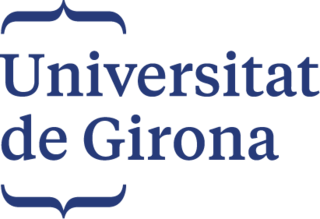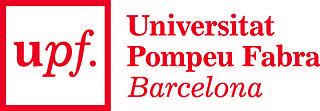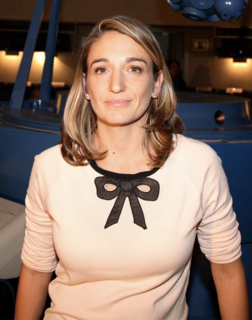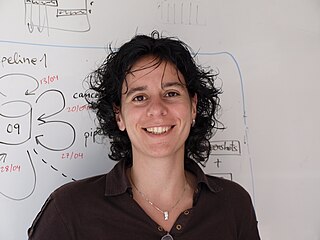Related Research Articles

The University of Girona is located in the city of Girona, Catalonia, Spain.
The University of Barcelona is a public university located in the city of Barcelona, Catalonia in Spain. With 63,000 students, it is one of the biggest universities in Spain. It is one of the oldest universities in both Catalonia and Spain, established in 1450.

Pompeu Fabra University is a public university located in the city of Barcelona, Catalonia in Spain. The university was created by the Autonomous Government of Catalonia in 1990, and was named after Pompeu Fabra, a Catalan engineer, grammarian and the main author of the normative reform of contemporary Catalan language. In 2021, UPF was ranked the best university in Spain and 10th best young university in the world by the Times Higher Education World University Rankings.

University of Rovira i Virgili is located in the Catalan cities of Tarragona and Reus, Spain. Its name is in honour of Antoni Rovira i Virgili.
Science Week refers to series of science-related events for the general public which are held in a specific countries during a designated week of the year. The aim of such science weeks is to engage and inspire people of all ages with science, engineering and technology.

The University of Lleida is a university based in Lleida (Catalonia), Spain. It was the first university in Catalonia and in the whole Crown of Aragon. It was founded in 1300, using the name of Estudi General de Lleida.

Mateo Valero Cortés is a Spanish computer architect. His research encompasses different concepts within the field of computer architecture, a discipline in which he has published more than 700 papers in journals, conference proceedings and books. Valero has received numerous awards, including the Eckert–Mauchly Award in 2007, for "extraordinary leadership in building a world class computer architecture research center, for seminal contributions in the areas of vector computing and multithreading, and for pioneering basic new approaches to instruction-level parallelism." He is the director of the Barcelona Supercomputing Center, which hosts the MareNostrum supercomputer.

Andreu Mas-Colell is an economist, an expert in microeconomics and a prominent mathematical economist. He is the founder of the Barcelona Graduate School of Economics and a professor in the department of economics at Pompeu Fabra University in Barcelona, Catalonia, Spain. He has also served several times in the cabinet of the Catalan government. Summarizing his and others' research in general equilibrium theory, his monograph gave a thorough exposition of research using differential topology. His textbook on microeconomics, co-authored with Michael Whinston and Jerry Green, is the most used graduate microeconomics textbook in the world.

Josep Penuelas or Josep Peñuelas i Reixach is a Catalan ecologist and researcher internationally recognized for his contributions in the fields of ecology and the environment. He was a student of Ramon Margalef.
The Banff International Research Station (BIRS) for Mathematical Innovation and Discovery was established in 2003. It provides an independent research institute for the mathematical sciences in North America, a counterpart to the Mathematical Research Institute of Oberwolfach in Europe. The research station, commonly known by its acronym, "BIRS", hosts over 2000 international scientists each year to undertake research collaboration in the mathematical sciences.

Abat Oliba CEU University is a private university located in Barcelona, Spain. It was founded in 1973 as the Abat Oliba College. In 2003, the Parliament of Catalonia approved its conversion to Abat Oliba CEU University. The university adopts the name of Abbot Oliba, Count of Berga and Ripoll, bishop of Vic, and founder of Montserrat because "aimed at making its spirit who established a thousand years the foundations of emerging Catalonia based on Roman and Christian culture".

Mayo Fuster Morell is a social researcher. Her research has focused on sharing economy, social movements, online communities and digital Commons, frequently using participatory action research and method triangulation. She has been part of the most important research centres studying Internet and its social effects, including the Berkman Center for Internet and Society, the MIT Center for Civic Media or the Berkeley School of Information. As an active citizen, she is the co-founder of multiple initiatives around digital Commons and Free Culture, such as the Procomuns Forum on collaborative economy.

Licia Verde is an Italian cosmologist and theoretical physicist and currently ICREA Professor of Physics and Astronomy at the University of Barcelona. Her research interests include large-scale structure, dark matter, dark energy, inflation and the cosmic microwave background.

Francesc Xavier Hernández Cardona is a Catalan historian, Professor of Didactics of Social Sciences of the University of Barcelona.
Forest Sciences and Technology Centre of Catalonia (CTFC) is a centre for forest research based in Solsona, Lleida, and is among the leading applied research centres in Spain. It was founded in 1996 as a consortium of five local and regional institutions. The institution has grown to employ over one hundred professionals who work in collaboration with different administrations, institutions and companies, and its annual budget is around 14 million euros.

The Institute for Bioengineering of Catalonia (IBEC) is an institution engaged in basic and applied research in bioengineering and nanomedicine, with experts working on tissue regeneration, biomechanics, molecular dynamics, biomimetics, drug delivery, organs ‘on-a-chip’, cell migration, stem cells, artificial olfaction and microbial biotechnology. The institute was created by the Government of Catalonia, the University of Barcelona and the Polytechnic University of Catalonia in December 2005 and is located at the Barcelona Science Park. The director of the institute is Prof. Josep Samitier, who took over from founding director Josep A. Planell i Estany in 2013. In 2014 IBEC was named a "Severo Ochoa Centre of Excellence" by the Spanish Ministry of Economy and Competitiveness.

The Catalan Institute of Nanoscience and Nanotechnology (ICN2) is a foundation located on the campus of the Autonomous University of Barcelona (UAB) whose mission is to promote interdisciplinary research in nanoscience and nanotechnology. In addition to research activities, the ICN2 provides training for researchers, education programs and services to industry and the scientific community.

Núria López Bigas is a Spanish biologist and research professor with expertise in medical genetics, computational biology, and bioinformatics. She is an ICREA professor at Pompeu Fabra University and she also leads the Biomedical Genomics Research Group at the Institute for Research in Biomedicine in Barcelona, Spain. Her research is focused on developing computational approaches to investigate cancer genomes.

Centres de Recerca de Catalunya is the corporative denomination of a group of centers of excellence based in Catalonia, Spain, called CERCA Centers, and the institution that coordinates them, called CERCA or I-CERCA.

Eva Miranda Galcerán is a Spanish mathematician specializing in dynamical systems, especially in symplectic geometry. Her research includes work with Victor Guillemin on the mathematics underlying the three-body problem in celestial mechanics.
References
- ↑ "Spotlight on Catalonia (2011)". Nature. Retrieved 2 December 2020.
- ↑ "Spotlight on Catalonia (2016)". Nature. Retrieved 2 December 2020.